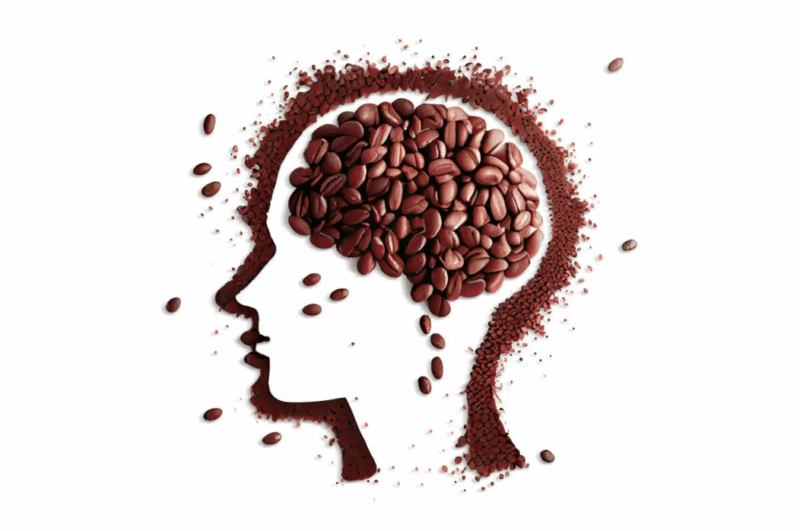
That cup of coffee you had during dinner with friends didn’t just keep you tossing and turning — it fundamentally altered how your brain operated during whatever sleep you managed to get. New research reveals that caffeine doesn’t simply block sleep; it transforms the sleeping brain into a more complex, hyperactive state that resembles being closer to peak mental performance.
Even more surprising: this coffee-induced brain makeover hits young adults much harder than middle-aged people, showing that your relationship with caffeine changes dramatically as you get older.
Scientists from the University of Montreal analyzed the brain waves of 40 healthy people during sleep after they consumed either 200 milligrams of caffeine (roughly equivalent to two cups of coffee) or a placebo pill. Participants spent two nights in a sleep laboratory, consuming either 200mg of caffeine or a placebo pill in a double-blind study. Brain activity was recorded using multi-channel EEG throughout the night, and the team applied multiple analytical approaches to identify patterns that distinguished caffeinated from non-caffeinated sleep.
They discovered that caffeine pushes the brain toward what’s called a “critical regime” — a state where neural networks operate at maximum efficiency and complexity.
Brain complexity and criticality are tied to optimal cognitive performance, enhanced information processing, and greater mental flexibility. When your brain operates in this critical zone, it’s essentially firing on all cylinders, processing information more efficiently and maintaining better communication between different brain regions.
Coffee Doesn’t Just Disturb Sleep—It Completely Rewires It
Most people assume caffeine simply prevents good sleep by keeping you awake longer or making sleep lighter. The study, published in Communications Biology, reveals something more fascinating: caffeine actually changes the fundamental nature of whatever sleep you do get, making your brain work overtime even during rest periods.
During non-REM sleep (the deep, restorative phase that typically shows low brain activity) caffeinated participants showed dramatically increased brain entropy and complexity. Their sleeping brains exhibited patterns more similar to wakefulness, with heightened information processing and neural communication that normally wouldn’t occur during this crucial recovery phase.
This effect was much stronger in younger adults aged 20-27 compared to middle-aged participants aged 41-58, particularly during REM sleep. Young people’s brains showed significant increases in multiple measures of complexity and criticality when caffeinated, while older adults showed much weaker responses.
Young Brains React Far More Dramatically to Caffeine
The age-related differences likely stem from changes in adenosine receptors, which are the brain’s “sleepiness switches” that caffeine blocks. As people age, they naturally lose adenosine A1 receptors, which means caffeine has fewer targets to affect.
With more receptors available in younger people, caffeine can exert a stronger influence on brain dynamics. This finding has practical implications for caffeine consumption across age groups. While middle-aged adults might feel they can handle that after-dinner espresso better than they used to, young adults are experiencing more dramatic changes to their sleep brain activity. These are changes that could affect the restorative functions of sleep.
Understanding the ‘Critical’ Brain State
To grasp what researchers mean by “critical” brain dynamics, consider neural networks like a perfectly tuned orchestra. Too little activity, and the brain operates sluggishly and inefficiently. Too much activity creates chaos. But right at the critical point, the brain achieves optimal performance with maximum information processing.
Caffeine appears to push sleeping brains toward this critical state, particularly during non-REM sleep. The researchers measured this using several sophisticated techniques that look at how repetitive or varied brain signals are and examine long-range patterns in brain activity.
All measures pointed to the same conclusion: caffeine makes sleeping brains more complex, more variable, and more similar to highly engaged waking brains. Machine learning algorithms could distinguish between caffeinated and non-caffeinated sleep with up to 75% accuracy based solely on these brain complexity measures.
Previous caffeine research focused mainly on obvious effects, such as how long it takes to fall asleep, how much you toss and turn, or changes in specific brain wave frequencies. This study took a deeper dive, using cutting-edge analysis techniques to examine how caffeine affects the fundamental dynamics of neural networks.
What This Means for Your Health
While operating in a critical brain state sounds beneficial (and can be during wakefulness) the implications for sleep are more complicated. Sleep serves crucial functions for memory consolidation, cellular repair, and toxin clearance from the brain. If caffeine is making sleeping brains work more like waking brains, it might interfere with these restorative processes.
The study also found that caffeine’s effects were much more pronounced during non-REM sleep compared to REM sleep. Non-REM sleep is particularly important for memory consolidation and brain restoration, so disruptions to this phase could have significant consequences for cognitive function and health.
For coffee lovers, the research serves as a wake-up call that their favorite beverage’s effects extend far beyond simple wakefulness — it’s literally rewiring how their brains operate throughout the night, with younger people experiencing the most dramatic changes to their sleep brain activity.
Source : https://studyfinds.org/caffeine-brain-waves-sleep-coffee/







